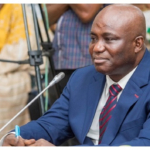
Minister for Food and Agriculture, Eric Opoku, has announced significant progress under the government’s Feed Ghana Programme, introduced by the Mahama administration to transform agriculture, boost food security, create jobs and reduce the country’s dependence on food imports.
Speaking at the Government Accountability Series in Accra on Monday, November 24, the Minister said several key interventions have been rolled out within the past nine months to modernise Ghana’s agricultural sector and increase productivity.
Mr Opoku stated that the programme has already delivered 10 new small dams and the rehabilitation of eight existing irrigation dams.
In addition, 250 solar-powered boreholes have been provided for farming communities and second-cycle schools across the five northern regions, as well as the Bono and Ahafo regions.
He said rehabilitation works are also ongoing on several major irrigation schemes. These include the 850-hectare Vea Irrigation Scheme in the Bolgatanga and Bongo districts of the Upper East Region, the 880-hectare Weta Irrigation Scheme in the Ketu North Municipality of the Volta Region, and the 100-hectare Tanoso Irrigation Scheme in the Techiman Municipality of the Bono East Region.
Similar upgrades are underway on the 930-hectare Kpong Irrigation Scheme in the Shai Osudoku and Lower Manya districts, the 200-hectare Ashaiman Irrigation Scheme, and the 245-hectare Aveyime Irrigation Scheme in the Volta Region.
Mr Opoku added that 25 out of 35 planned solar-powered boreholes have been completed, with the remaining 10 expected to be finished in the first quarter of 2026. A further 44 solar-powered boreholes are being developed for selected districts in northern Ghana.
The Minister also announced that processes have begun for the development of new inland valleys to expand rice production.
These include the 175-hectare Anunuso Inland Valley in the Anunuso, Brofoyedu, Nkwawkwanua, and Awaham communities; the 150-hectare Atonsu Inland Valley in the Atonsu and Abramaso communities; and the 647-hectare Kawampe Inland Valley serving nine communities in the Bono East Region.
Other sites include the 114-hectare Odaho and Odamu inland valleys in Yaw Nkrumah and Donuaso, and the 114-hectare Waamu-Kumi Inland Valley in the Ashanti Region.
Mr Opoku further revealed that the Government of Ghana and the Korea Rural Cooperation (KRC) are constructing irrigation infrastructure on 100 hectares of land to support rice seed production.
He assured the public that the Mahama administration is committed to expanding irrigation systems to ensure all-year-round farming.
He announced that 10,000 tonnes of high-quality rice seed will be produced by 2027, saying, “Ghana will be well on its way to rice seed independence.”
Highlighting progress in stabilising food prices, the Minister recalled that food inflation reached an unprecedented 61 per cent in January 2023, dropped to 28.3 per cent in January 2025, and had further declined to 9.5 per cent by October 2025.
Mr Opoku said these outcomes demonstrate the gains being made through the Feed Ghana Programme and other agricultural policies aimed at enhancing food production and strengthening Ghana’s agricultural foundation.



